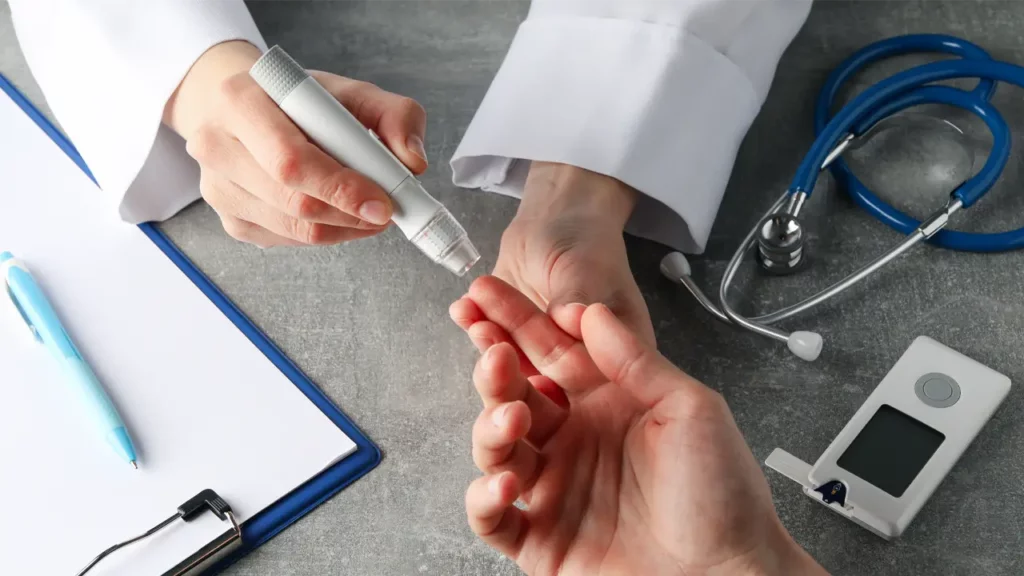Diabetes mellitus is a chronic disease that affects millions of people worldwide. It is a condition that occurs when the body cannot produce or use insulin properly, leading to high levels of glucose or blood sugar in the blood. Effective management of diabetes is crucial, and diabetes self-management training is a vital part of diabetes care.
Living with diabetes can be challenging, but the diabetes self-management program provides patients with diabetes the tools they need to manage their diabetes effectively.
Diabetes Care and Education
Diabetes is a prevalent chronic disease affecting millions of people worldwide, including adults with type 2 diabetes mellitus. Diabetes self-management is essential to help manage this condition effectively. Diabetic self-management education is an integral part of diabetes treatment and aims to provide patients with diabetes the necessary knowledge and skills to manage their diabetes effectively. The goal of diabetes self-management is to enable individuals to take an active role in managing their health, working in partnership with their health care providers.
The Academy of Nutrition and Dietetics recommends diabetes self-management education for adults with type 2 diabetes to improve their health outcomes. These programs cover a range of topics, including nutrition, exercise, medication management, and glucose monitoring. Studies have shown that successful diabetes self-management is associated with better blood glucose control, a lower risk of diabetes-related complications, and improved quality of life among people with diabetes.
Diabetes self-management education can take many forms, including individual counseling, group classes, and online resources. The American Diabetes Association (ADA) has established national standards for diabetes self-management education and support, which outline the key components of successful diabetes self-management programs. These programs provide diabetics with self-management training, enabling them to better manage their diabetes and reduce their risk of complications.
Managing Diabetes
Managing diabetes is crucial for people living with type 1 or type 2 diabetes. It involves a combination of lifestyle changes, medication, and ongoing monitoring of blood glucose levels. A diabetes self-management plan can help individuals with diabetes manage their condition effectively.
Lifestyle changes are an essential aspect of diabetes self-management and include eating a healthy diet, engaging in regular physical activity, and maintaining a healthy weight. A diabetes self-management education program can help individuals with diabetes develop the necessary self-management skills to make these lifestyle changes and improve their diabetes outcomes.
Medication is often necessary to manage diabetes effectively. People with type 1 diabetes require insulin therapy, while those with type 2 diabetes may also require medication such as oral hypoglycemic agents or injectable medications to manage their blood glucose levels. However, medication alone is not sufficient to control diabetes, and lifestyle changes are also essential.
For adults with diabetes, daily self-management is critical for disease control and prevention. Managing type 2 diabetes requires a combination of lifestyle changes and, in some cases, medication. Meanwhile, living with type 1 diabetes typically involves insulin-dependent diabetes mellitus and ongoing monitoring of blood glucose levels. Diabetes symptoms should not be ignored, and a timely diabetes diagnosis is crucial to help manage the disease and prevent complications.
In addition to medical treatment, social support and diabetes self-management support can also play a crucial role in helping individuals manage their diabetes effectively. Diabetes attitudes can impact an individual’s willingness to manage their diabetes, and social support systems can provide emotional and practical assistance to individuals living with diabetes. The ADA recommends that healthcare providers integrate family support into diabetes care to improve disease control and prevention.
Diabetes Self-Management Program
The diabetes self-management program is a vital component of diabetes care and aims to help individuals with diabetes manage their condition effectively through education and ongoing support.
This program typically includes diabetes self-management education and training, which is tailored to meet the specific needs and goals of everyone. It may also include ongoing monitoring and follow-up with healthcare providers, as well as access to social support systems.
The ADA and the ADCES have established national standards for diabetes self-management education and support, which outline the core components of an effective program. These components include:
- Assessment of individual needs and goals
- Education about diabetes and its management
- Nutrition counseling
- Physical activity counseling
- Medication management
- Monitoring of blood glucose levels
- Prevention and detection of diabetes-related complications
- Psychosocial support
The program is often delivered by a team of healthcare professionals, including diabetes educators, nurses, dietitians, and pharmacists, who work together to provide comprehensive care and support to individuals with diabetes. The program may be offered in various settings, such as hospitals, clinics, community health centers, or online platforms.
Research has shown that participation in a diabetes self-management program can lead to improved glycemic control, reduced risk of complications, and improved quality of life for people with diabetes. A meta-analysis of the effect of outpatient diabetes self-management training on patients with type 2 diabetes found that self-management education programs can significantly improve blood glucose control and reduce the risk of diabetes-related complications.
Improving Health Outcomes
Participating in a diabetes self-management program can lead to various positive health outcomes for individuals with diabetes. By learning the skills and strategies needed to manage their condition effectively, participants may better control their blood glucose levels, reduce their risk of complications, and improve their overall health and well-being.
In addition to improving glycemic control and reducing the risk of complications, joining a diabetes self-management program can also result in:
- Improved blood pressure and cholesterol levels
- Increased physical activity levels
- Better nutrition habits
- Increased confidence in managing diabetes
- Improved quality of life
Research has also shown that diabetes self-management programs can be cost-effective, as they may decrease the need for hospitalization, emergency room visits, and other healthcare services.
To ensure that diabetes self-management programs provide high-quality care and support, the ADA and the ADCES have established an accreditation program. This program sets rigorous standards for program content, staff qualifications, and patient outcomes, and helps ensure that individuals with diabetes have access to high-quality care and support.
The position statement of the American Diabetes Association emphasizes the importance of self-management education and support for patients with diabetes mellitus. Chronic disease self-management programs, including outpatient diabetes self-management training, have been shown to improve diabetes outcomes and enhance the quality of life of those diagnosed with diabetes.
Types of Diabetes
There are several types of diabetes, each with its own unique characteristics and management considerations. The three main types of diabetes are:
- Type 1 diabetes: This type of diabetes is typically diagnosed in childhood or adolescence and is characterized by the body’s inability to produce insulin. Individuals with type 1 diabetes require insulin injections or an insulin pump to manage their blood glucose levels.
- Type 2 diabetes: This is the most common type of diabetes and is often diagnosed in adulthood. Individuals with type 2 diabetes may still produce insulin, but their body may not be able to use it effectively. Management of type 2 diabetes typically involves lifestyle changes such as diet and exercise, as well as medications or insulin injections.
- Gestational diabetes: This type of diabetes occurs during pregnancy and typically resolves after delivery. However, women with gestational diabetes have an increased risk of developing type 2 diabetes later in life.
Less common types of diabetes include:
- LADA (Latent Autoimmune Diabetes in Adults): A form of type 1 diabetes that is diagnosed in adulthood.
- MODY (Maturity Onset Diabetes of the Young): A rare form of diabetes that is caused by genetic mutations and typically diagnosed in childhood or adolescence.
- Secondary diabetes: Diabetes that is caused by an underlying medical condition such as pancreatitis or Cushing’s syndrome.
It’s important for individuals with diabetes to receive an accurate diagnosis and appropriate management plan, as the type of diabetes can impact treatment recommendations and overall health outcomes.
DrKumo Remote Patient Monitoring for Diabetes Self-Management
Diabetes self-management is a critical component of effective diabetes care, and remote patient monitoring (RPM) technology can play a crucial role in helping individuals manage their condition. DrKumo is a leading provider of RPM solutions for chronic disease management, including diabetes. By using state-of-the-art, HIPAA-compliant, mobile-enabled, and continuous real-time monitoring technology, DrKumo RPM platform can help patients with diabetes manage their health conditions from the comfort of their homes.
DrKumo RPM technology is designed to solve the most painful problems in healthcare by providing real-time intelligence for timely intervention. With its highly scalable, continuous, real-time monitoring and AI/ML engine, DrKumo RPM platform can support healthcare providers in delivering high-quality care to patients with diabetes. In addition to diabetes care, DrKumo RPM platform can also be used for acute care, post-operation, and hospital care at home, making it a versatile solution for healthcare providers.
DrKumo user-friendly RPM platform enables patients to monitor their health conditions conveniently and effectively, while healthcare providers can use the real-time intelligence provided by the platform to make timely interventions and adjustments to care plans. With a culture that is innovative, collaborative, and technology-driven, DrKumo is revolutionizing the way people access quality healthcare across the world.
By providing effective RPM solutions for chronic disease management, DrKumo is helping to improve the lives of patients with diabetes and other chronic conditions, as well as the healthcare providers who care for them.
Takeaways
Diabetes education and self-management are essential for people with type 2 diabetes to effectively manage their condition. Diabetes management education and diabetic self-management training can help individuals learn the skills and strategies they need to manage their diabetes and prevent or delay complications. As non-insulin dependent diabetes mellitus is associated with lifestyle factors, effective self-management can play a significant role in managing the condition. Therefore, investing in diabetes self-management programs can help people with diabetes improve their quality of life and reduce their risk of long-term health complications.
If you have diabetes, consider enrolling in a diabetes self-management program and ask utilizing RPM to help manage your condition more effectively. Contact DrKumo now.









